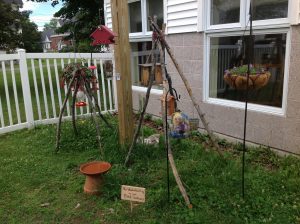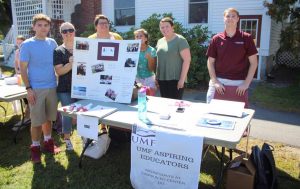Sep 23, 2017 | News |
Kelsey Dunn – Contributing Writer
UMF students, faculty and staff have mixed reviews about the University Store’s new Virtual Bookstore.
Some students said their experience went smoothly, while others are experiencing frustration and anger towards the new modernization of the campus bookstore.
George Miller, the Director of Advising, sent out a student body email recently stating, “I’m hearing from quite a few students that they are having trouble getting their books in time to get their work done, or don’t have money for books.” He also urged students to get in contact with their professors if they still do not have their books as soon as possible.
Linda Leiva, a practicum lecturer, and supervisor of student teaching has had similar observations.
“I’ve noticed that students have not bought texts due to costs and feeling that the teacher won’t use the book as much in class as they say they would,” said Leiva. “Therefore, they either purchase used books that are cheaper or they borrow a book from their friends.”
Katie Grout, a freshman, describes her involvement with the Virtual Bookstore as being something she would not like to endure again.
“I don’t like the virtual bookstore at all. It took me a week and a half to get one book and my next textbook was ordered on August 28 but was not shipped until September 8,” she said. “I was very angry with this and I felt helpless because I couldn’t do my homework.” Grout, had ordered some of her books through the virtual bookstore and the others were through Amazon.
Amber Chesley, a UMF sophomore, was puzzled when she first attempted to order her books through the virtual bookstore. “[Ordering] got easier due to previous experience ordering online. I heard from first-year students that it was confusing for them,” she said.
Chesley ordered all of her textbooks through the virtual bookstore this semester, although one of her textbooks was incorrect for one of her classes.
“I got the wrong book for one of my classes. All my books were delivered separately; two came in two weeks later than my other two books,” she said. “The books were in good condition.”
Aimee Degroat, the University Store manager, realizes that there are some problems with the first year of the Virtual Bookstore, but keeps a positive outlook.
“Although some orders were delayed due to hard findings, some books were back ordered at the publisher,” Degroat said. “The initial feedback from the community was well.”
Last year, the Flyer reported on the University Store using different business strategies and were considering turning to a virtual bookstore at the time.
To visit the Virtual Bookstore, go to www.umf.ecampus.com
Sep 23, 2017 | News |
Cheyenne Judkins – Contributing Writer
This fall semester is the first for a brand new allies program created for incoming UMF freshmen.
The program is similar to having a peer advisor, but was created as a way to provide more resources and support for first generation students who aren’t education majors or Johnson Scholars.
Kirsten Swan, the Director of Student Leadership and Service, said she started planning last January, as that’s typically when she begins focusing on the fall program. Swan also noted that there used to be a similar program but they did away with it, so it’s been revised and revamped to fit the needs of UMF’s incoming students.
Swan is also on the Retention and Recruitment Committee, and they could see UMF was losing a lot of students. Although students leave for a variety of reasons, many of the students leaving appeared to be freshman.
“The number of freshman leaving campus fueled the drive to create the allies program,” said Swan.
The program is made up of 29 upperclassmen volunteers from the orientation staff, and each freshman was assigned an upperclassmen ally. The students were assigned based on their residential areas. Amanda Dwyer, a senior and Special Education major at UMF, volunteered to be an upperclassmen ally for the program and this was her fifth year on orientation staff.
“I personally was assigned 21 freshmen, but only four have showed up to meetings,” said Dwyer.
Allies continue to communicate with new students through the preregistration process. During that time, freshmen are able to meet with their allies or message them any questions they may have. Dwyer made a Facebook page for the students she was assigned, and she gets questions from them often via Facebook.
“Through being an upperclassman ally, I learned that sometimes freshman are shy and hesitant to ask questions in person, but they ask a lot more online via Facebook,” Dwyer said.
Kaitlyn Mitchell, a freshman Creative Writing major at UMF, enjoyed the allies program because it allowed her to ask questions and having an ally made her more comfortable, although she wished the allies would have been assigned based on major.
“It’s nice because it’s easier than going to your advisor,” Mitchell said. “It was good to be able to talk about how orientation was going and ask questions if we had them.”
Dwyer says it’s nice when she runs into her freshman allies on campus and they say, “hey Amanda! How are you?” Dwyer recalls, “one of my favorite moments was when one of my freshmen came up to me and thanked me for telling them about the Employment Fair because they received a job offer and accepted it.”
Dwyer says she hopes they continue the program but states, “the first meeting should really be mandatory because if they don’t attend meetings, they’re not receiving the extra care and guidance the university is trying to provide.” Swan plans to continue the allies program in the future and says, “I hope to involve other student leaders.”

Sep 23, 2017 | Feature |
Haiyu Zheng – Contributing Writer
UMF International students are doing a better job in adjusting to American campus life, despite various cultural differences for the first few weeks.

From L to R: Haiyu Zheng, Hui Shao, Clementine Leroy, Mana Abdi, Kasi Pratt, Cheyenne VanDooren, Pauline Barrier, Prescilia Ganache, and Elisa Ducept.
(Photo Courtesy of Cheyenne VanDooren)
The 14 international students/staff members initially had a hard time dealing with the differences in terms of the food, study, and lifestyle. In these 14, there are three language assistants, two staff members, seven exchange students and two J-1 students (International students study here for a degree).
These new members of the UMF community hail from various locations including France, Japan, China, Canada, Tanzania, and Argentina.
Chinese student Wenyi Lu became emotional after recalling an experience where she ran into financial issues.
“I almost wanted to cry when I found my bank account did not work here,” she said. “That was literally my hardest time since I came here.”
“There is a gap between my life in France and here,” said Prescilia Ganache, a French TA. “Everything is so different. The food, our thought patterns, even the way we dress,” she said. She recalled her initial shock when she found students wearing sandals and socks together. “In France, we always dress very formal,” Ganache said.
For some international students, the biggest adjustment has been the American food.
“They have more fat, sugar, and salt in food here compared to what I am used to,” said Clementine Leroy, another French TA. “Also, there are so many spices. I feel frustrated when I get something spicy by accident,” she said.
“I’m glad they try to make International foods that cater to us,” said Yuewei Zhang, a junior from China. “Even if they are fully Americanized.”
Academics were another concern for the International students. They found it hard to get involved in the class discussion. Clementine Gondo-Lescaillet, an International student from France, said that she was so stressed out about her marketing class.
“There were a lot of times when I came up with some ideas but it was too late to share due to my broken English,” she said.
Despite the difficulties, the International students have a positive mind towards the challenges and are trying to enjoy the life and find the beauty of this university.
“I appreciate the relationship between the students and professors,” said Asako Miyazaki, the Japanese instructor. She was surprised to find out the students are very casual in class.
“In Japan, students tend to be polite and always bow every time we see someone who’s older than us,” she said.
Kesuma Mkare, a freshman from Tanzania, said “American students do more sports than the students in my country. I like the idea that everyone wants to try something new.” Mkare was very happy to join the soccer team in UMF. “I got to meet a lot of people and made friends who care about me,” he said.
The International students also get sufficient support from UMF students and faculties.
Leroy was impressed by people’s hospitality. “The people all around the campus are always so friendly. If you have questions, you just go and ask them for help and you could always get more than what you expect,” she said.
The advisor of International Department Lynne Eustis put much effort in helping her students settle in during the orientation week.
“We prior to help them get ready for school life before other students arrive and get to know each other as a group so that they have an immediate network of support from friends, and also get some time to get familiar with the campus, the local downtown area,” Eustis said.
Stephen Riitano, a CA of Mallett Hall, also has a goal to help the International students adjust to the campus life more easily through some programs with them. “I am trying to be as open and inviting as possible,” said Riitano. “We like to invite the residents to come down and talk about some differences in the cuisine or anything interesting about their countries,” he said.

Sep 23, 2017 | News |
Leah Boucher –Staff Reporter
For the second year in a row, UMF hosted a summer institute for Maine educators and pre-service educators on June 23rd and 24th, where they learned how to incorporate nature into all areas of education.
Participants were able to get out and explore the nature around Farmington the day before the actual conference, where they could hike to Poplar Stream Hut and tour the local Bonney and Flint Woods, then settled back at UMF for a day of conferences.
Assistant Professor of Education and committee member for this institute, Kathryn Will-Dubyak, is pleased that UMF can offer a wide variety of conferences, which are the first of their kind in the area. “This is the only nature-based institute spanning Pre-K through 12 in greater New England to my knowledge,” said Will-Dubyak, “which creates an incredible opportunity for the many pre-service educators and educators around Farmington.” There were around 80 participants this year who attended both days.
From this program, participants were given the chance to listen to a variety of lectures but also participated in hands-on experiences, giving them first-hand knowledge on how nature plays a crucial role in education across grade levels.
“This summer institute helped educators either understand how they could begin to engage with nature in all areas of instruction or to develop their understanding of how nature can play a large role in a variety of instructional opportunities,” said Will-Dubyak.
Associate Professor of Science Education and another committee member of this institute, Carole Lee, was asked to be a leader in this year’s set of conferences.
“Last year, there was more of a focus on lower elementary grades, and I was thrilled to join this program and bring my knowledge of nature among the upper grades in school,” said Lee. “I led some conferences myself, such as Engineering Design Inspired by Nature as well as Biomimicry.”
Another conference participants could attend focused on the idea of a natural playground, which UMF was able to put into action last year outside the Sweatt-Winter Child Care and Education Center. A third-year child care aide at Sweatt-Winter, Ashley Hinkley, who is also a senior Elementary Education major, noticed a major shift in the design of the playground once the natural playground replaced the old one.
“The previous playground had one slide, a climbing wall, and a picnic table,” said Hinkley. “The natural playground has a berm for the kids to climb on with three slides and a garden that the kids water, pick from, and later eat.”
Another feature of this new playground that is a hit among the children is the bird-watching area. “There are bird feeders and bird baths outside, and inside there are journals for the children to sketch the birds they see through the window,” said Hinkley.

The bird sanctuary at Sweatt-Winter, part of the new natural playground on campus.
(Photo Courtesy of the UMF College of Education, Health, and Rehab Services.
Carole Lee is grateful that a topic from the conference was able to be shown to participants right here at UMF. “The success of the natural playground installation on campus shows educators that nature can help children see how they can interact with their environment in a positive way, such as feeding the birds and building houses for them,” said Lee.
There are plans for committee members to meet over the course of 2017 and 2018 to see if a third annual nature-based institute will take place next summer.
“We are not sure as of yet if it will happen, as it takes an incredible amount of people power for pre-conferences and conferences that only span two days, but it is definitely a possibility,” said Will-Dubyak.

Sep 22, 2017 | Feature |
By Gavin Elliott – Contributing Write
After the recent name change approved by Student Senate, UMF Aspiring Educators, previously known as Student M.E.A. (Maine Education Association), seem to be growing in popularity.
Last year, the UMF Aspiring Educators were down to seven to ten members. The level of involvement was higher in the past, according to Beth Evans, a professor at UMF and faculty advisor for Aspiring Educators.
“When I first started teaching here at UMF around 20 years ago, just about every undergrad Ed Major was a member of at least one of the two education clubs,” Evans said.
This year at the first meeting, numbers had tripled when compared to the amount of members last year. This success is partially due to the club’s recent name change.

UMF Aspiring Educators of Maine at the Fall 2017 Club Fair
(Photo by Mitchell Agailb)
According to Stephen Riitano, the president of the Aspiring Educators, “the change was to align with the N.E.A. (National Education Association),” and to “let the students of UMF know that a membership to the student M.E.A. is not necessary, although UMF Aspiring Educators is still affiliated [with them].”
Aspiring Educators also held an Informational Meeting in the Ed Center along with Advocates for Disability Awareness Club (ADAC) and UMF Association for the Education of Young Children (AEYC). Through this meeting, the members of it are very much clubs hoped to inform new students, as well as current students, of what they each do.
Members of Aspiring Educators will often find themselves brainstorming and discussing upcoming events, fundraising, looking at poverty’s impacts on schools, connecting with other educators and learning skills they may not typically receive in their regular classrooms to aid in their professional development.
Professor Evans elaborated, “It is imperative to know what everyone else is doing in this profession. Early childhood to middle to special ed, etc. and this club does a great job of preparing ed students to do just this.”
Evans went on to say “The club is great because the movers and shakers of the professional life we call teaching.”
The treasurer of Aspiring Educators, Carson Hope, says, “The club is great because you get to network with other educators and clubs, and learn about the community part of teaching.” This networking can also impact more people by allowing them to pool their resources, said Evans.
According to Riitano, an example of the clubs pooling of their resources will be seen on September 26th when Kelly-Anne Rush, more commonly known as Crafty Teacher Lady, will be speaking at 5:30 pm in the Landing about how “teachers can be financially smart while providing meaningful and engaging lessons for their students.”
Later in October, they will be hosting Scare Fest, where “a panel of current teachers and administrators come to UMF and discuss the real side of teaching,” Riitano said.
For more information or any questions on the Aspiring Educators, like them on Facebook at “UMF Aspiring Educators of Maine,” or drop into any of their meetings on Wednesdays, room 106 of the Kalikow Education Center at 7:30 pm


